Unit 4 Don't eat in class. Section A Grammar Focus -3c 课件(共41张PPT)
文档属性
| 名称 | Unit 4 Don't eat in class. Section A Grammar Focus -3c 课件(共41张PPT) | 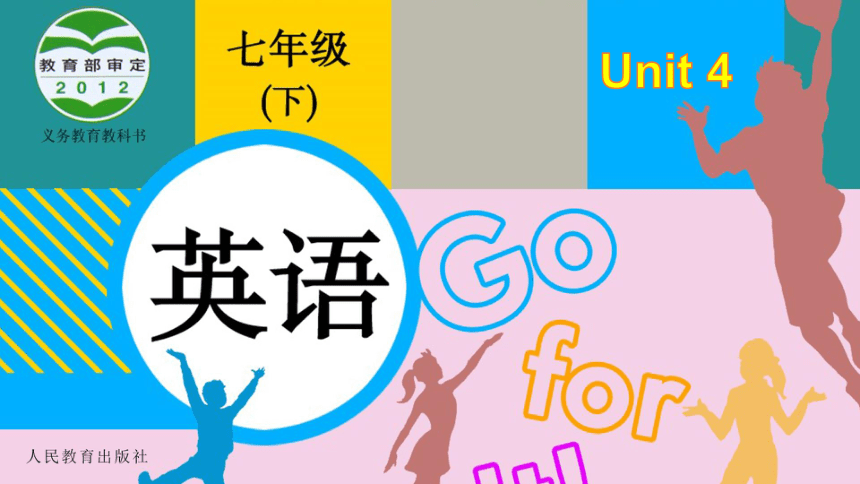 | |
| 格式 | zip | ||
| 文件大小 | 3.5MB | ||
| 资源类型 | 教案 | ||
| 版本资源 | 人教新目标(Go for it)版 | ||
| 科目 | 英语 | ||
| 更新时间 | 2022-02-20 10:03:54 | ||
图片预览

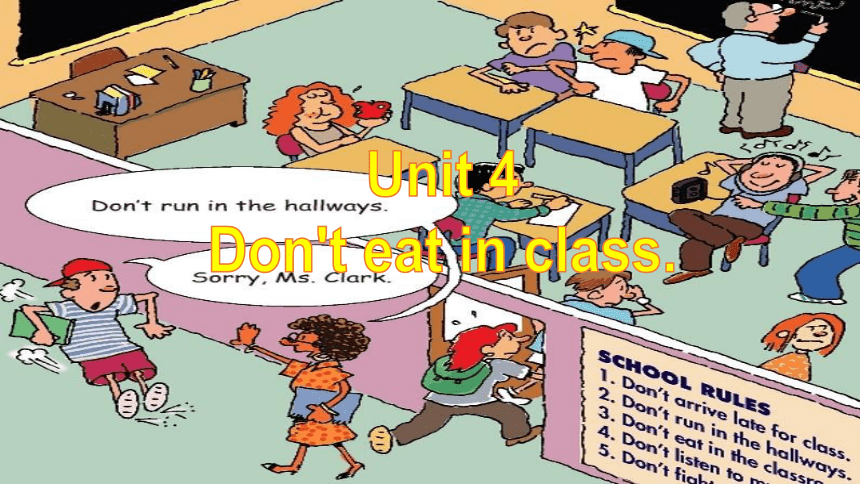
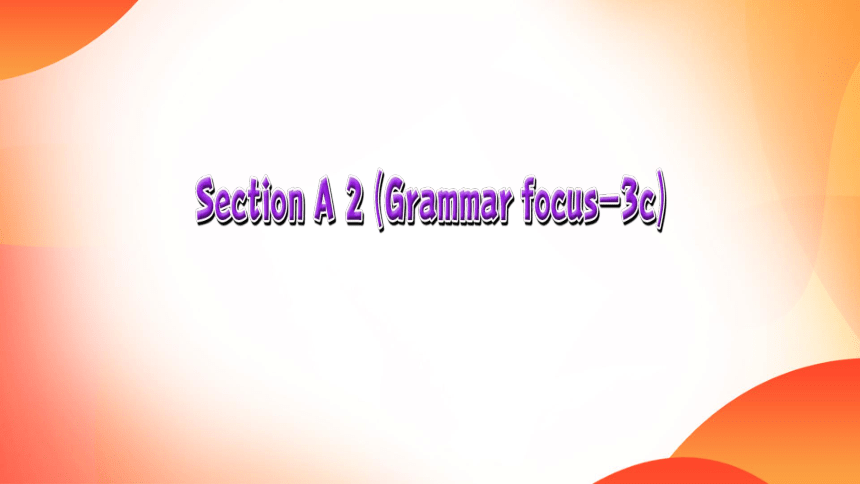
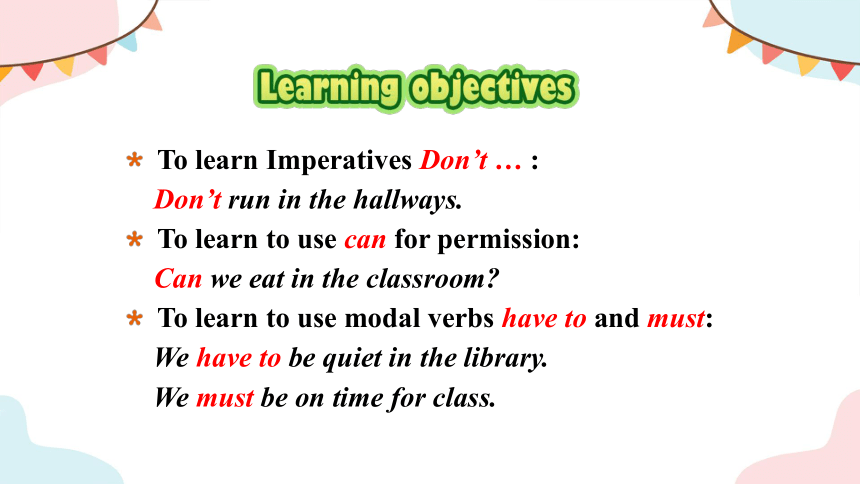
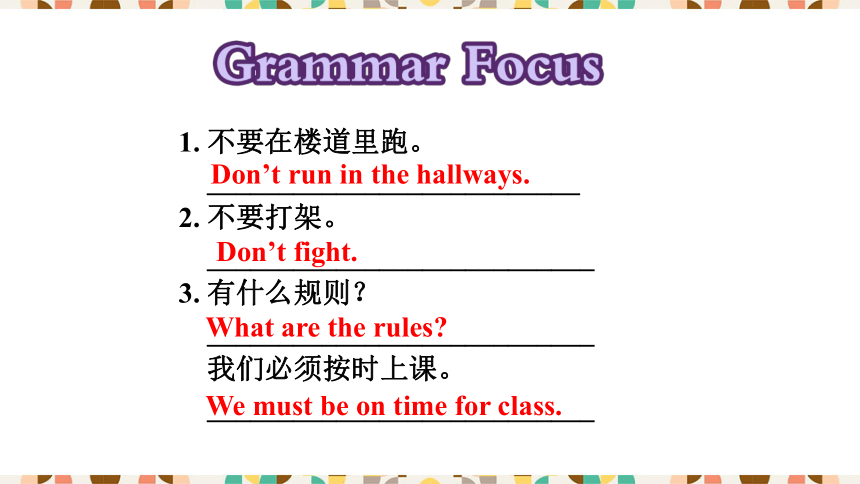
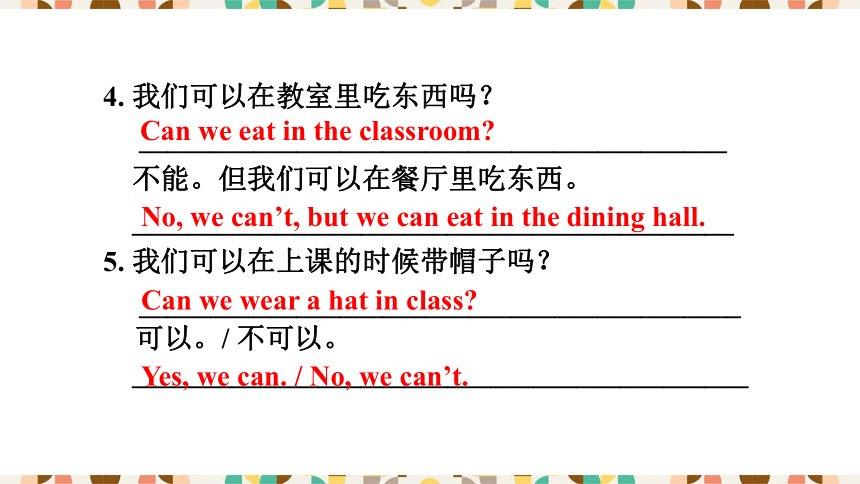
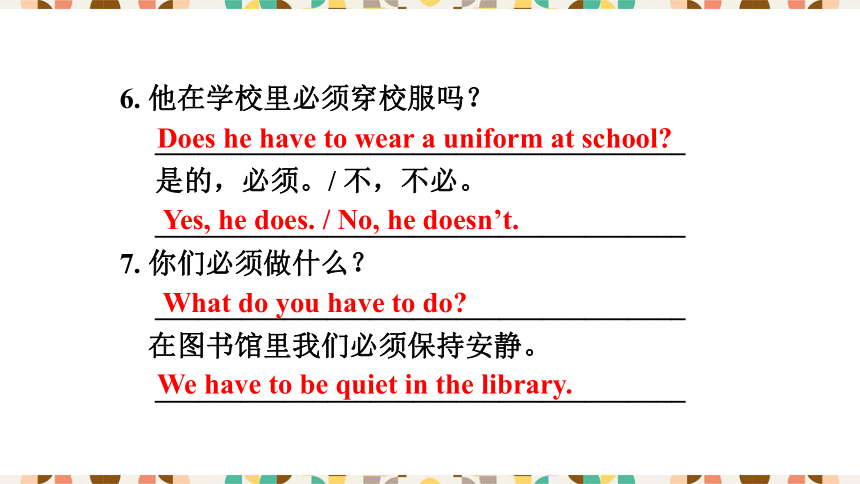
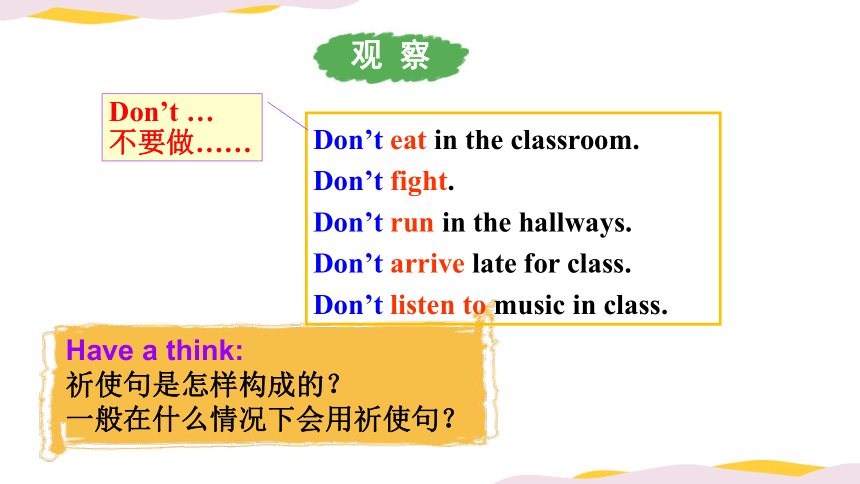
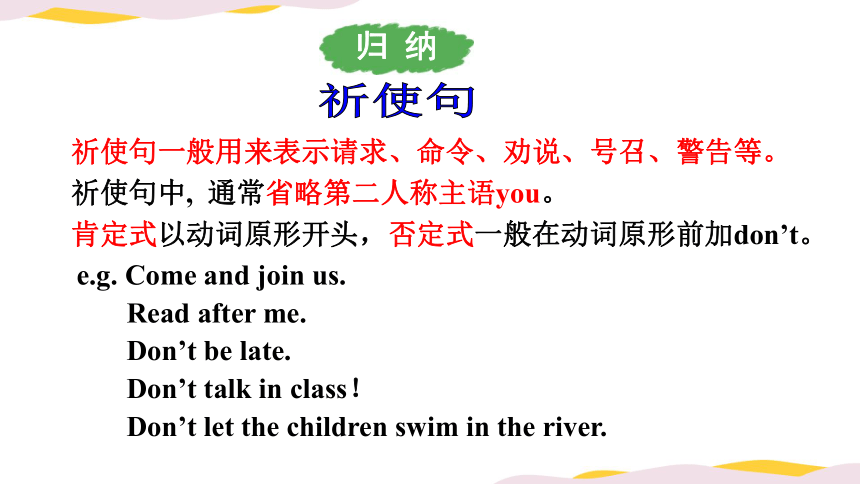
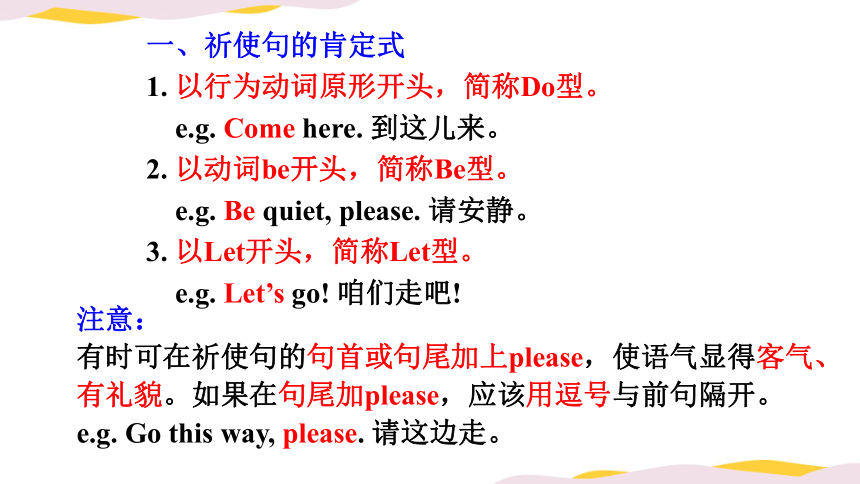
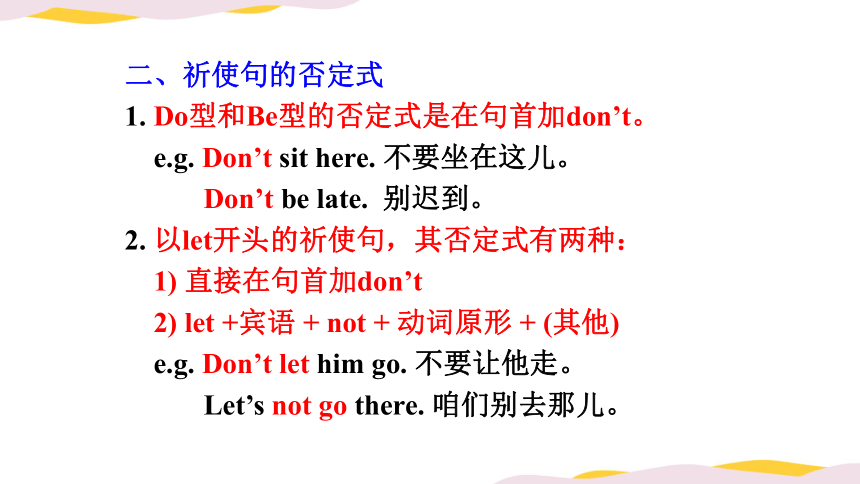
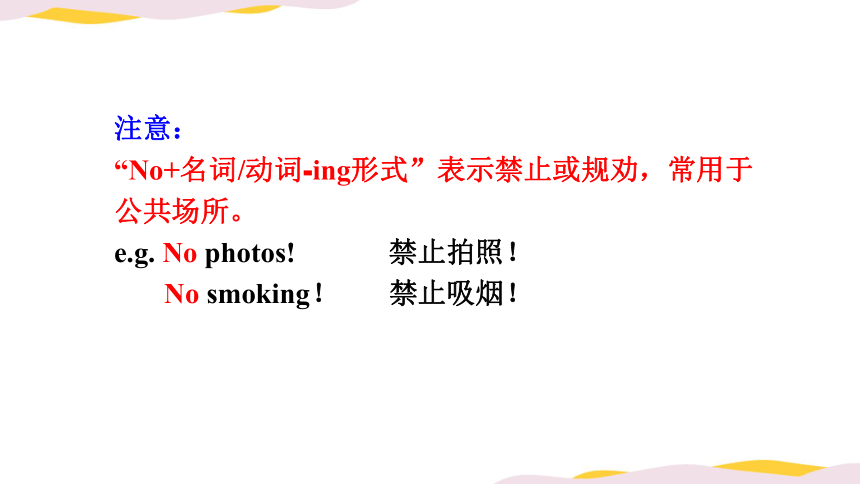
文档简介
(共41张PPT)
Unit 4
Unit 4
Don't eat in class.
To learn Imperatives Don’t … :
Don’t run in the hallways.
To learn to use can for permission:
Can we eat in the classroom
To learn to use modal verbs have to and must:
We have to be quiet in the library.
We must be on time for class.
1. 不要在楼道里跑。
__________________________
2. 不要打架。
___________________________
3. 有什么规则?
___________________________
我们必须按时上课。
___________________________
Don’t fight.
Don’t run in the hallways.
What are the rules
We must be on time for class.
4. 我们可以在教室里吃东西吗?
_________________________________________
不能。但我们可以在餐厅里吃东西。
__________________________________________
5. 我们可以在上课的时候带帽子吗?
__________________________________________
可以。/ 不可以。
___________________________________________
Can we wear a hat in class
No, we can’t, but we can eat in the dining hall.
Can we eat in the classroom
Yes, we can. / No, we can’t.
6. 他在学校里必须穿校服吗?
_____________________________________
是的,必须。/ 不,不必。
_____________________________________
7. 你们必须做什么?
_____________________________________
在图书馆里我们必须保持安静。
_____________________________________
Yes, he does. / No, he doesn’t.
Does he have to wear a uniform at school
What do you have to do
We have to be quiet in the library.
Don’t eat in the classroom.
Don’t fight.
Don’t run in the hallways.
Don’t arrive late for class.
Don’t listen to music in class.
Don’t …
不要做……
Have a think:
祈使句是怎样构成的?
一般在什么情况下会用祈使句?
观 察
祈使句一般用来表示请求、命令、劝说、号召、警告等。
祈使句中, 通常省略第二人称主语you。
肯定式以动词原形开头,否定式一般在动词原形前加don’t。
祈使句
e.g. Come and join us.
Read after me.
Don’t be late.
Don’t talk in class!
Don’t let the children swim in the river.
归 纳
一、祈使句的肯定式
1. 以行为动词原形开头,简称Do型。
e.g. Come here. 到这儿来。
2. 以动词be开头,简称Be型。
e.g. Be quiet, please. 请安静。
3. 以Let开头,简称Let型。
e.g. Let’s go! 咱们走吧!
注意:
有时可在祈使句的句首或句尾加上please,使语气显得客气、有礼貌。如果在句尾加please,应该用逗号与前句隔开。
e.g. Go this way, please. 请这边走。
二、祈使句的否定式
1. Do型和Be型的否定式是在句首加don’t。
e.g. Don’t sit here. 不要坐在这儿。
Don’t be late. 别迟到。
2. 以let开头的祈使句,其否定式有两种:
1) 直接在句首加don’t
2) let +宾语 + not + 动词原形 + (其他)
e.g. Don’t let him go. 不要让他走。
Let’s not go there. 咱们别去那儿。
注意:
“No+名词/动词 ing形式”表示禁止或规劝,常用于公共场所。
e.g. No photos! 禁止拍照!
No smoking! 禁止吸烟!
【语境应用】翻译句子。
1) 快点走。
Walk quickly.
2) 别让他们说话。
Don’t let them talk. / Let them not talk.
3) 安静点!
Be quiet!
4) 不要在这儿吃东西。
Don’t eat here.
1. — ______ your hands before dinner, Tony.
—No problem, Mom.
A. Wash B. Washes C. Washing D. To wash
(2021广西梧州)
2. ____ it over, and you will be able to work out the problem.
A. Thinking B. To think C. Think
(2021黑龙江绥化)
A
C
3. —Mike, _______ play football in the street next time. It’s dangerous(危险的).
—OK, I won't do that again, mom.
A. mustn't B. must C. don’t D. do
(2021贵州毕节)
C
情态动词can, must, have to 后面都接动词原形
Have a think:
1. 情态动词在用法上有什么共同点?
2. can在本单元主要表示什么含义?它还可表达什么意思?
3. have to在用法上与其他情态动词有何区别?
观 察
can 可以,表示请求、允许。
I can play badminton, but I can’t play volleyball.
can还可表示能力, 能,会。
-- Can the students run in the hallways
-- Yes, they can./No, they can’t.
We can’t eat in the classroom.
could 也可表示请求,但比can的语气更委婉。
Could you tell him to call me back
can
情态动词can
归 纳
肯定句:
主语+can+动词原形+其他.
否定句:
主语+can not/can’t+动词原形+其他.
疑问句:
Can+主语+动词原形+其他
肯定回答:Yes, 主语+can.
否定回答:No, 主语+can’t.
情态动词can的句型结构:
must 必须;一定
表示主观需要或责任感的驱使有必要或有义务去做某事,没有人称和时态的变化,后接动词原形。
句型结构:主语+must+动词原形+其他
情态动词must
e.g. Don’t arrive late for class. We must be on time.
You must read a book before you watch TV.
mustn’t 表示 “不准; 禁止”。
e.g. You mustn’t talk to your mother like that.
have to 必须;不得不
表示因客观的需要不得不做某事,有人称和时态的变化,后接动词原形。
可用于不同的时态,有人称和数的变化。
其否定式don’t / doesn’t have to表示“不必;没必要”。
否定形式和疑问句形式均需要借助助动词do才可以进行变化。
情态动词have to
e.g. It’s a little late and I have to go now.
You don’t have to come if you don’t want to.
She has to finish her work today.
--Does he have to go to bed now
--Yes, he does./ No, he doesn’t.
1. —Can you play table tennis
—Yes, I ______.
A. can B. must C. may
(2021广西桂林)
2.—Whose skirt is this
—It _______ be Carol’s. She is the only girl in the team(队).
A. might B. need C. must
(2021湖南郴州)
A
C
3. —Whose T-shirt is this, Michael
—It ______ not be mine. Mine is white.
A. need B. can C. must
(2021湖北恩施州)
B
Library Rules
Don’t talk.
_______________________________
_______________________________
_______________________________
Write the rules for the school library.
Don’t listen to music in the library.
Don’t eat in the library.
Don’t take photos in the library.
1. Be quiet (she/have to/in the library)
Q: Does she have to be quiet in the library
A: Yes, she does.
Use the words to make questions about the rules. Then write answers according to your school.
2. Eat (he/have to/in the dining hall)
Q: _________________________________
A: __________________________________
3. Listen to music (we/can/in the hallways)
Q: __________________________________
A: __________________________________
Yes, he does.
Does he have to eat in the dining hall
Can we listen to music in the hallways
No, we can’t.
4. Wear a hat (we/can/in the classroom)
Q: __________________________________
A: ___________________________________
Can we wear a hat in the classroom
No, we can’t.
At my dream school, we don’t have to come to school every day…
We can eat in class…
Make up five cool rules for your dream school. Share your rules with the class. Your classmates vote for the Coolest School!
We don’t have to wear school uniforms…
We don’t have to do homework every day…
Discuss and make rules for the computer room in your school.
Computer Room Rules
_______________
_______________
_______________
________________
________________
We must be quiet in the computer room.
Don’t run in the computer room.
Don’t eat or drink in the computer room.
Wear slippers in the computer room.
Computer Room Rules
___________________________________
___________________________________
___________________________________
___________________________________
___________________________________
We must be quiet in the computer room.
Don’t eat or drink in the computer room.
Don’t run in the computer room.
Wear slippers in the computer room.
Clean the computer room every day.
Don’t run in the hallways.
不要在楼道里跑。
Don’t be late for class.
上课不许迟到。
Don’t fight.
不许打架。
We have to be quiet in the library.
我们必须在图书馆保持安静。
I. 根据句意及括号内所给单词的提示填空。
1. Please _______(bring) my notebook to me tomorrow.
2. I have to _______(walk) to school.
3. Don’t _______(run) in the hallway.
4. Can I _______(go) out on school nights
5. We must _______(get) up early.
get
bring
walk
run
go
II. 根据括号内的要求完成下列各题, 每空一词(含缩略形式)。
1. —Can I ride a bike to school (补全肯定答语)
—Yes, _______ _______.
2. You can’t be late for class. (改为祈使句)
_______ _______ late for class.
3. They have to clean the classroom every day. (对划线部分提问)
_______ _______ _______ have to _______ every day
What do they do
you can
Don’t be
4. Gina has to work for eight hours. (改为一般疑问句并作否定回答)
—_______ Gina _______ to work for eight hours
—_______, _______ ________.
5. You can draw on the paper. (改为否定句)
You _______ _______ on the paper.
can’t draw
Does have
No she doesn’t
Ⅲ. 根据汉语意思, 完成英语句子, 每空一词 (含缩略形式)。
1. Peter, 不要在教室里踢足球。
Peter, _______ _______ soccer in the classroom.
2. 我可以吃个冰激凌吗?
_______ I __________ an ice-cream
3. Linda每天晚上必须练习吉他。
Linda _______ _________ the guitar every evening.
4. 他在学校不得不穿校服。
He _______ _______ _______ a uniform at school.
5. 请看这张图片。
_______ _______ this picture, please.
Look at
don’t play
Can eat / have
must practice
has to wear
IV. 根据对话内容,从方框中选择恰当的选项补全对话,其中有两项多余。
A: Hey, Rita! What is your new school like
B: It’s big and nice.
A: (1)________________
B: Yes, it does.
A. Can you wear your hats in class
B. Does it have many rules
C. What can you do
D. What are the rules
E. Can I help you
F. Do you have to wear your uniforms at school
G. What do you think of these rules
B
A: (2)________________
B: We must get to school before 8:00 a.m. We can’t eat in the classroom.
A: (3)________________
B: Yes, we do.
A. Can you wear your hats in class
B. Does it have many rules
C. What can you do
D. What are the rules
E. Can I help you
F. Do you have to wear your uniforms at school
G. What do you think of these rules
D
F
A: (4)________________
B: No, we can’t.
A: (5)________________
B: Very good. I think they’re good for us.
A: Do you have fun at your new school
B: Yeah!
A. Can you wear your hats in class
B. Does it have many rules
C. What can you do
D. What are the rules
E. Can I help you
F. Do you have to wear your uniforms at school
G. What do you think of these rules
A
G
1. Preview Grammar.
2. Write five rules in your family.
3. Preview the new words and expressions in Section B.
Unit 4
Unit 4
Don't eat in class.
To learn Imperatives Don’t … :
Don’t run in the hallways.
To learn to use can for permission:
Can we eat in the classroom
To learn to use modal verbs have to and must:
We have to be quiet in the library.
We must be on time for class.
1. 不要在楼道里跑。
__________________________
2. 不要打架。
___________________________
3. 有什么规则?
___________________________
我们必须按时上课。
___________________________
Don’t fight.
Don’t run in the hallways.
What are the rules
We must be on time for class.
4. 我们可以在教室里吃东西吗?
_________________________________________
不能。但我们可以在餐厅里吃东西。
__________________________________________
5. 我们可以在上课的时候带帽子吗?
__________________________________________
可以。/ 不可以。
___________________________________________
Can we wear a hat in class
No, we can’t, but we can eat in the dining hall.
Can we eat in the classroom
Yes, we can. / No, we can’t.
6. 他在学校里必须穿校服吗?
_____________________________________
是的,必须。/ 不,不必。
_____________________________________
7. 你们必须做什么?
_____________________________________
在图书馆里我们必须保持安静。
_____________________________________
Yes, he does. / No, he doesn’t.
Does he have to wear a uniform at school
What do you have to do
We have to be quiet in the library.
Don’t eat in the classroom.
Don’t fight.
Don’t run in the hallways.
Don’t arrive late for class.
Don’t listen to music in class.
Don’t …
不要做……
Have a think:
祈使句是怎样构成的?
一般在什么情况下会用祈使句?
观 察
祈使句一般用来表示请求、命令、劝说、号召、警告等。
祈使句中, 通常省略第二人称主语you。
肯定式以动词原形开头,否定式一般在动词原形前加don’t。
祈使句
e.g. Come and join us.
Read after me.
Don’t be late.
Don’t talk in class!
Don’t let the children swim in the river.
归 纳
一、祈使句的肯定式
1. 以行为动词原形开头,简称Do型。
e.g. Come here. 到这儿来。
2. 以动词be开头,简称Be型。
e.g. Be quiet, please. 请安静。
3. 以Let开头,简称Let型。
e.g. Let’s go! 咱们走吧!
注意:
有时可在祈使句的句首或句尾加上please,使语气显得客气、有礼貌。如果在句尾加please,应该用逗号与前句隔开。
e.g. Go this way, please. 请这边走。
二、祈使句的否定式
1. Do型和Be型的否定式是在句首加don’t。
e.g. Don’t sit here. 不要坐在这儿。
Don’t be late. 别迟到。
2. 以let开头的祈使句,其否定式有两种:
1) 直接在句首加don’t
2) let +宾语 + not + 动词原形 + (其他)
e.g. Don’t let him go. 不要让他走。
Let’s not go there. 咱们别去那儿。
注意:
“No+名词/动词 ing形式”表示禁止或规劝,常用于公共场所。
e.g. No photos! 禁止拍照!
No smoking! 禁止吸烟!
【语境应用】翻译句子。
1) 快点走。
Walk quickly.
2) 别让他们说话。
Don’t let them talk. / Let them not talk.
3) 安静点!
Be quiet!
4) 不要在这儿吃东西。
Don’t eat here.
1. — ______ your hands before dinner, Tony.
—No problem, Mom.
A. Wash B. Washes C. Washing D. To wash
(2021广西梧州)
2. ____ it over, and you will be able to work out the problem.
A. Thinking B. To think C. Think
(2021黑龙江绥化)
A
C
3. —Mike, _______ play football in the street next time. It’s dangerous(危险的).
—OK, I won't do that again, mom.
A. mustn't B. must C. don’t D. do
(2021贵州毕节)
C
情态动词can, must, have to 后面都接动词原形
Have a think:
1. 情态动词在用法上有什么共同点?
2. can在本单元主要表示什么含义?它还可表达什么意思?
3. have to在用法上与其他情态动词有何区别?
观 察
can 可以,表示请求、允许。
I can play badminton, but I can’t play volleyball.
can还可表示能力, 能,会。
-- Can the students run in the hallways
-- Yes, they can./No, they can’t.
We can’t eat in the classroom.
could 也可表示请求,但比can的语气更委婉。
Could you tell him to call me back
can
情态动词can
归 纳
肯定句:
主语+can+动词原形+其他.
否定句:
主语+can not/can’t+动词原形+其他.
疑问句:
Can+主语+动词原形+其他
肯定回答:Yes, 主语+can.
否定回答:No, 主语+can’t.
情态动词can的句型结构:
must 必须;一定
表示主观需要或责任感的驱使有必要或有义务去做某事,没有人称和时态的变化,后接动词原形。
句型结构:主语+must+动词原形+其他
情态动词must
e.g. Don’t arrive late for class. We must be on time.
You must read a book before you watch TV.
mustn’t 表示 “不准; 禁止”。
e.g. You mustn’t talk to your mother like that.
have to 必须;不得不
表示因客观的需要不得不做某事,有人称和时态的变化,后接动词原形。
可用于不同的时态,有人称和数的变化。
其否定式don’t / doesn’t have to表示“不必;没必要”。
否定形式和疑问句形式均需要借助助动词do才可以进行变化。
情态动词have to
e.g. It’s a little late and I have to go now.
You don’t have to come if you don’t want to.
She has to finish her work today.
--Does he have to go to bed now
--Yes, he does./ No, he doesn’t.
1. —Can you play table tennis
—Yes, I ______.
A. can B. must C. may
(2021广西桂林)
2.—Whose skirt is this
—It _______ be Carol’s. She is the only girl in the team(队).
A. might B. need C. must
(2021湖南郴州)
A
C
3. —Whose T-shirt is this, Michael
—It ______ not be mine. Mine is white.
A. need B. can C. must
(2021湖北恩施州)
B
Library Rules
Don’t talk.
_______________________________
_______________________________
_______________________________
Write the rules for the school library.
Don’t listen to music in the library.
Don’t eat in the library.
Don’t take photos in the library.
1. Be quiet (she/have to/in the library)
Q: Does she have to be quiet in the library
A: Yes, she does.
Use the words to make questions about the rules. Then write answers according to your school.
2. Eat (he/have to/in the dining hall)
Q: _________________________________
A: __________________________________
3. Listen to music (we/can/in the hallways)
Q: __________________________________
A: __________________________________
Yes, he does.
Does he have to eat in the dining hall
Can we listen to music in the hallways
No, we can’t.
4. Wear a hat (we/can/in the classroom)
Q: __________________________________
A: ___________________________________
Can we wear a hat in the classroom
No, we can’t.
At my dream school, we don’t have to come to school every day…
We can eat in class…
Make up five cool rules for your dream school. Share your rules with the class. Your classmates vote for the Coolest School!
We don’t have to wear school uniforms…
We don’t have to do homework every day…
Discuss and make rules for the computer room in your school.
Computer Room Rules
_______________
_______________
_______________
________________
________________
We must be quiet in the computer room.
Don’t run in the computer room.
Don’t eat or drink in the computer room.
Wear slippers in the computer room.
Computer Room Rules
___________________________________
___________________________________
___________________________________
___________________________________
___________________________________
We must be quiet in the computer room.
Don’t eat or drink in the computer room.
Don’t run in the computer room.
Wear slippers in the computer room.
Clean the computer room every day.
Don’t run in the hallways.
不要在楼道里跑。
Don’t be late for class.
上课不许迟到。
Don’t fight.
不许打架。
We have to be quiet in the library.
我们必须在图书馆保持安静。
I. 根据句意及括号内所给单词的提示填空。
1. Please _______(bring) my notebook to me tomorrow.
2. I have to _______(walk) to school.
3. Don’t _______(run) in the hallway.
4. Can I _______(go) out on school nights
5. We must _______(get) up early.
get
bring
walk
run
go
II. 根据括号内的要求完成下列各题, 每空一词(含缩略形式)。
1. —Can I ride a bike to school (补全肯定答语)
—Yes, _______ _______.
2. You can’t be late for class. (改为祈使句)
_______ _______ late for class.
3. They have to clean the classroom every day. (对划线部分提问)
_______ _______ _______ have to _______ every day
What do they do
you can
Don’t be
4. Gina has to work for eight hours. (改为一般疑问句并作否定回答)
—_______ Gina _______ to work for eight hours
—_______, _______ ________.
5. You can draw on the paper. (改为否定句)
You _______ _______ on the paper.
can’t draw
Does have
No she doesn’t
Ⅲ. 根据汉语意思, 完成英语句子, 每空一词 (含缩略形式)。
1. Peter, 不要在教室里踢足球。
Peter, _______ _______ soccer in the classroom.
2. 我可以吃个冰激凌吗?
_______ I __________ an ice-cream
3. Linda每天晚上必须练习吉他。
Linda _______ _________ the guitar every evening.
4. 他在学校不得不穿校服。
He _______ _______ _______ a uniform at school.
5. 请看这张图片。
_______ _______ this picture, please.
Look at
don’t play
Can eat / have
must practice
has to wear
IV. 根据对话内容,从方框中选择恰当的选项补全对话,其中有两项多余。
A: Hey, Rita! What is your new school like
B: It’s big and nice.
A: (1)________________
B: Yes, it does.
A. Can you wear your hats in class
B. Does it have many rules
C. What can you do
D. What are the rules
E. Can I help you
F. Do you have to wear your uniforms at school
G. What do you think of these rules
B
A: (2)________________
B: We must get to school before 8:00 a.m. We can’t eat in the classroom.
A: (3)________________
B: Yes, we do.
A. Can you wear your hats in class
B. Does it have many rules
C. What can you do
D. What are the rules
E. Can I help you
F. Do you have to wear your uniforms at school
G. What do you think of these rules
D
F
A: (4)________________
B: No, we can’t.
A: (5)________________
B: Very good. I think they’re good for us.
A: Do you have fun at your new school
B: Yeah!
A. Can you wear your hats in class
B. Does it have many rules
C. What can you do
D. What are the rules
E. Can I help you
F. Do you have to wear your uniforms at school
G. What do you think of these rules
A
G
1. Preview Grammar.
2. Write five rules in your family.
3. Preview the new words and expressions in Section B.
同课章节目录
- Unit 1 Can you play the guitar?
- Section A
- Section B
- Unit 2 What time do you go to school?
- Section A
- Section B
- Unit 3 How do you get to school?
- Section A
- Section B
- Unit 4 Don't eat in class.
- Section A
- Section B
- Unit 5 Why do you like pandas?
- Section A
- Section B
- Unit 6 I'm watching TV.
- Section A
- Section B
- Review of Units 1-6
- Unit 7 It's raining!
- Section A
- Section B
- Unit 8 Is there a post office near here?
- Section A
- Section B
- Unit 9 What does he look like?
- Section A
- Section B
- Unit 10 I'd like some noodles.
- Section A
- Section B
- Unit 11 How was your school trip?
- Section A
- Section B
- Unit 12 What did you do last weekend?
- Section A
- Section B
